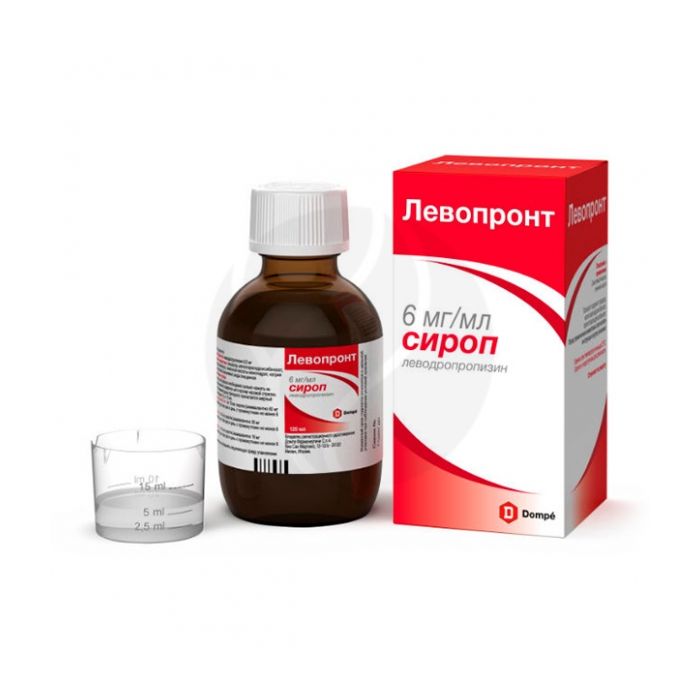Levopront syrup 6mg / ml, 120ml
Expiration Date: 11/2025
Russian Pharmacy name:
Левопронт сироп 6мг/мл, 120мл
Inside.
To open the bottle, you must firmly press the cap and simultaneously turn it counterclockwise.
For accurate measurement of the dose of the drug, a measuring cup with marks Z, 5 and 10 ml is attached.
Adults and children over 30 kg: 10 ml of syrup (equivalent to 60 mg of levodropropizine) up to three times a day at intervals of at least 6 hours.
Children from 20 to 30 kg: 5 ml of syrup (equivalent to 30 mg of levodropropizine) up to three times a day at intervals of at least 6 hours.
Children from 10 to 20 kg: 3 ml of syrup (equivalent to 18 mg of levodropropizine) up to three times a day at intervals of at least 6 hours.
The drug should be taken between meals.
The duration of treatment should not exceed seven days. If symptoms persist for more than 7 days, a doctor should be consulted.
Syrup in the form of a transparent, colorless or slightly yellowish solution with a characteristic cherry smell.
1 ml levodropropizine 6 mg
Excipients: sucrose - 400 mg, methyl parahydroxybenzoate - 1.3 mg, propyl parahydroxybenzoate - 0.2 mg, citric acid monohydrate - 9.6 mg, sodium hydroxide - 3.6 mg, cherry flavor - 2.5 mg, purified water - up to 1 ml.
Hypersensitivity to levodropropizine;
diseases associated with bronchial hypersecretion;
decreased mucociliary function (Kartagener's syndrome, ciliary dyskinesia);
pregnancy, breastfeeding period; children under 2 years of age.
With caution: in patients with severe renal impairment (creatinine clearance less than 35 ml / min), with severe liver dysfunction, in elderly patients, while taking it with sedatives, with diabetes mellitus.
pharmachologic effect
Antitussive agent. Antitussive activity is due to a peripheral effect on the tracheobronchial tree. The mechanism of the antitussive action of levodropropizine is to slow down the transmission of nerve impulses inside C-fibers, suppressing the release of neuropeptide sensors from C-fibers in vitro.
Levodropropizine does not cause depression of the respiratory center and does not affect mucociliary clearance in humans.
In patients with chronic respiratory failure, levodropropizine has no suppressive effect on the respiratory system, both during spontaneous breathing and during hypercapnic ventilation.
Pharmacokinetics
After oral administration, levodropropizine is rapidly absorbed and distributed in the human body. The oral bioavailability of levodropropizine is more than 75%.
Plasma protein binding is insignificant (11-14%).
T1 / 2 is 1-2 hours. It is excreted by the kidneys both unchanged and in the form of metabolites (conjugated levodropropizine and conjugated p-hydroxylevodropropizine). After 48 hours, the excretion of levodropropizine and the above metabolites by the kidneys is about 35%.
With repeated administration of levodropropizine, there was no change in its pharmacokinetic parameters and cumulation.
Side effect
From the immune system: allergic and anaphylactic reactions, eyelid edema, angioedema.
On the part of the psyche: irritability, lethargy, personality changes or personality disorders.
From the nervous system: fainting, gait instability, vertigo, tremors, paresthesias, tonic-clonic seizures and minor epileptic seizures.
From the side of the organ of vision: mydriasis, bilateral blindness.
From the side of the cardiovascular system: palpitations, tachycardia, atrial bigeminia, arterial hypotension.
From the respiratory system: shortness of breath, cough, swelling of the respiratory tract.
From the digestive system: stomach pain, abdominal pain, nausea, vomiting, diarrhea, glossitis, aphthous stomatitis.
From the liver and biliary tract: cholestatic hepatitis.
From the side of metabolism: hypoglycemic coma.
Skin and subcutaneous tissue disorders: urticaria, erythema, exanthema, pruritus, skin reactions, epidermolysis.
From the musculoskeletal system: weakness in the lower extremities;
General reactions: general malaise, generalized edema, asthenia.
Application during pregnancy and lactation
Contraindicated for use during pregnancy and lactation (breastfeeding).
Application for violations of liver function
Use with caution in patients with severe liver dysfunction.
Application for impaired renal function
Use with caution in patients with severe renal failure (creatinine clearance less than 35 ml / min).
Application in children
Contraindicated for use in children under 2 years of age.
Use in elderly patients
Use with caution in elderly patients.
special instructions
It is used with caution in patients with severe renal impairment (creatinine clearance less than 35 ml / min), with severe liver dysfunction, in elderly patients, while taking it with sedatives, with diabetes mellitus.
Influence on the ability to drive vehicles and use mechanisms
It should be used with caution in patients engaged in potentially hazardous activities requiring a high speed of psychomotor reactions.
Drug interactions
Levodropropizine does not enhance the pharmacological effect of drugs acting on the central nervous system (for example, benzodiazepines, alcohol, phenytoin, imipramine), does not modify the action of oral anticoagulants (for example, warfarin) and does not affect the hypoglycemic effect of insulin. However, in patients with individual hypersensitivity, a depressing effect on the central nervous system is possible while taking levodropropizine with sedatives.
Clinical studies have not demonstrated any interactions with drugs used in the treatment of diseases of the bronchopulmonary system, such as beta2-adrenomimetics, methylxanthines and their derivatives, GCS, antibiotics, mucolytic and antihistamines.

